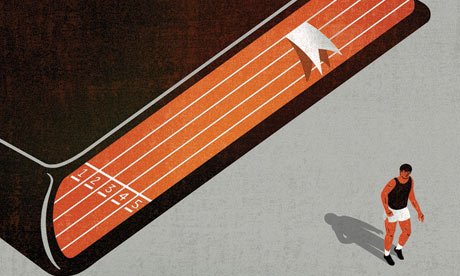
It's the season of "beach reads" and Best Summer Books lists – and thus, also, the season for the re-emergence of the perennial question of when, if ever, it's OK to give up on a book halfway through. "This is surely a strange advice," scoffed Dr Johnson in response to the notion that you should finish every book you start. "You may as well resolve that whatever men you happen to get acquainted with, you are to keep them for life." A good analogy, since many people treat abandoning a novel like a milder version of abandoning a lover or friend.
"Choosing to terminate a relationship with a book prematurely remains strangely agonising, a decision fraught with guilt," one Wall Street Journal writer argued the other day, adding a newish twist: the hunch that, thanks to Kindles and iPads, the urge to throw in the towel might be getting harder to resist. Other fears about e-reading have proved only partly justified: consuming your words via a screen, research suggests, doesn't damage comprehension, though long-term recall might be worse. But in an era of "frictionless sharing" and effortless gadgets, might it also be getting too easy to give up?
Personally, I'm immune to the book-abandonment psychodrama, possibly because I have to read so many with titles such as May Cause Miracles: A 40-Day Guidebook Of Subtle Shifts For Radical Change And Unlimited Happiness. But the pain of abandoning other projects – unassembled furniture, unfinished box sets, etc – still makes me feel like the critic Mark O'Connell, who confessed on the New Yorker's website to being a "promiscuous reader". "I worry that perhaps it's a symptom of some larger weakness of character or fatal atrophy of the intellect," he wrote. He was, he suspected, nothing but "a pathetic serial book-adulterer who'll chase after anything in a dust jacket".
Several psychological phenomena, presumably, contribute to this post-abandonment regret, most obviously the "sunk cost bias": once you've invested time and effort, it's a wrench to walk away. (O'Connell also notes the Stockholm Syndrome Theory Of Long Novels: you start craving the achievement of finishing, whether or not a book's worth it.) Another that seems pertinent is the Zeigarnik Effect, named after Bluma Zeigarnik, a Russian psychologist who noticed something about waiters in 1920s Vienna: they could hold many complex orders in mind until the food was served, but once an order was complete, they forgot it. In her subsequent experiments, people who were asked to perform simple tasks remembered them better when interrupted than when allowed to finish. Non-completion weighs on the mind.
Hence my official position: it's fine to abandon books or other projects – but you've got to really abandon them, not let them fade amid vague intentions to finish them some day. "It cannot be said often enough that one should not postpone; one abandons," said the management expert Peter Drucker. Give the unassembled bookshelf to someone who wants it; throw the beach-read into the sea. Make abandonment a positive choice. Otherwise you'll be paralysed, unable to walk away entirely or to finish, stuck in a catch-22. Which is, by the way – according to the website Goodreads – the book that people are most likely to start but never complete.
oliver.burkeman@theguardian.com
Follow Oliver on Twitter.

